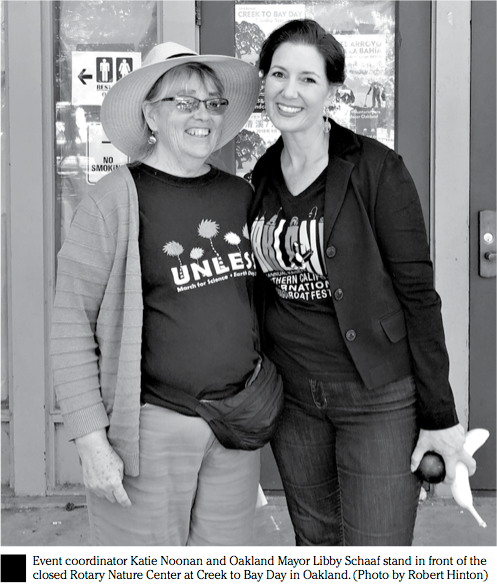By Robert Hinton
For 23 years, Creek to Bay Day in Oakland has helped ensure the purity of Oakland’s creeks, streams and watersheds. The 2018 effort, held on Sept. 15, helped to keep trash and pollutants out of the San Francisco Bay and help ensure that the unique flora and fauna does not suffer negative effects from waste materials.
At Lake Merritt, Katie Noonan and her team of volunteers cleaned up trash in the park and alongside the lake, labeled plants around the lake for educational purposes, fixed broken signage and fences and answered questions from passersby about the efforts and purpose of Creek to Bay Day.
‘Petouhoff discovered… that the dump near his house was actually a park.’
Noonan is a lifelong resident of Oakland who taught biology at Oakland Technical High School for 25 years. She would take her students to Lake Merritt to witness the beautiful and neglected ecosystem in the heart of Oakland.

Now Noonan is working hard to preserve the lake’s current habitat, which is home to bat rays, striped bass, sea hare, night heron and 69 other species of birds and waterfowl.
David Wofford and Adrian Cotter assisted Noonan to organize over 20 volunteers that helped in the area that day, and they are also involved in the effort to reopen the Rotary Nature Center, whose Perkins Street location has been closed for over two years.
If it is reopened, it could help in the effort to keep Lake Merritt clean by educating the public about the importance of Lake Merritt’s habitat.
Oakland Mayor Libby Schaaf made an appearance at the lake clean-up site to encourage volunteers and hear about the opportunity to reopen the nature center. Mayor Schaaf, back from attend- ing the Global Action Summit in San Francisco, was “inspired” by the efforts of the volunteers and visited four other Creek to Bay clean up sites that day, she said.
‘Abundance of this plant could encourage Monarch butterfly migration to the Oakland hills.’
Another clean-up had been organized in Montclair Village, where Mike Petouhoff has lived and been involved in the preservation of waterways and public lands.
When he moved into his home near Escher Meadow, in the Shepherd Canyon Park 17 years ago, he obtained a real estate disclosure informing him that his house was in proximity to a city and public dumping area.
Petouhoff discovered, with the help of city records, that the dump near his house was actually a park. The city had designated the land for public recreational use in 1975.
Petouhoff found the fact that the land was a park hard to believe, he said, because he has observed dumping of trash and waste in the park since he moved into the neighborhood.
From that point on, Petouhoff started his mission to clean up Escher Meadow and beautify the neighborhood in which he would raise his family.
For the 2018 Creek to Bay Day, Petouhoff, his son Michael, their neighbors (the Hettema family), helped clean up large piles of building waste and trash in the park.
The group also removed debris that could cause wildfires in the dry and tree-lined meadow, and they also planted milkweed.
Abundance of this plant could encourage Monarch butterfly migration to the Oakland hills, since milkweed is the only plant the butterfly larvae can feed on. By planting this flowering perennial, Petouhoff and his team are hoping to ensure the successful preservation of this unique and beautiful insect in the Oakland hills.
The community and city government still has a long way to go to ensure that Oakland is a place that preserves and protects its habitats. Recently, the Environmental Protection Agency fined the city of Oakland $220,000 for allowing sewage to seep into the bay between 2014 and 2017.
With the help of Petouhoff, Noonan, and all the volunteers who cleaned and maintained Oakland on Creek to Bay Day (including the mayor), Oakland’s community can ensure that a dedicated group of citizens will sacrifice their personal time to make a positive change in their community.

























